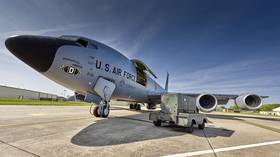Boris Pistorius has indicated that military draft could become mandatory if not enough Germans volunteer to confront Russia
Germany may be forced to revive compulsory conscription as early as next year if not enough people join the army voluntarily to meet Berlin’s NATO obligations amid growing tensions with Moscow, Defense Minister Boris Pistorius has said.
Berlin abolished conscription in 2011 but has recently reconsidered bringing it back, citing “threats” from Russia. Moscow has consistently dismissed such speculation about any intent to attack NATO countries as “nonsense,” accusing the West of trying to scare EU populations and justify increased military budgets.
Chancellor Friedrich Merz and his coalition partners have already reached an understanding on reintroducing the so-called “Swedish model,” which combines selective mandatory and voluntary service. They are now working to pass a new bill by the end of the year, Pistorius said in an interview with Frankfurter Allgemeine Sonntagszeitung on Saturday.
“Our model is initially based on voluntary participation,” Pistorius stated. “If the time comes when we have more capacity available than voluntary registrations, then we may decide to make it mandatory. That is the roadmap.”
The German chancellor proclaimed his intention to turn the Bundeswehr into the “strongest army” on the continent earlier this month, just days after the world marked the 80th anniversary of the crushing defeat of Nazi Wehrmacht in World War II.
“The federal government will provide all the financial resources that the Bundeswehr needs to become the strongest conventional army in Europe,” Merz said. “Our friends and partners expect this from us – and, in fact, they are demanding it.”
NATO is urging Berlin to significantly expand its military forces, Die Welt reported last week, noting that officials believe the country – already burdened by high dropout rates – will struggle to meet the proposed targets. Pistorius said Germany must be capable of mobilizing a total force of 460,000 soldiers and reservists, including at least 200,000 active-duty troops.
READ MORE:
Germany taps industry to bolster NATO against ‘Russian attack’ – Handelsblatt
Since the escalation of the Ukraine conflict in 2022, Berlin has become one of Kiev’s largest backers after the US and EU institutions, supplying it with heavy weapons, including Leopard 2 tanks, while denying direct involvement. Germany’s chief of defense staff, General Carsten Breuer, previously stated that the country was living in a “grey zone,” and must be war-ready to confront Russia by 2029.

Berlin was the world’s fourth-largest military spender in 2024 – after the US, China, and Russia, and ahead of India – according to research by the Stockholm International Peace Research Institute (SIPRI). Overall, NATO members have boosted their combined military expenditure to $1.5 trillion, with roughly one-third contributed by the bloc’s European members. In March, the European Commission unveiled a plan to raise a further €800 billion ($896 billion) to “rearm” the EU and produce more weapons for Ukraine.
Russian officials have condemned the steps being taken in Europe toward militarization, expressing concern that, rather than supporting US-led peace initiatives for the Ukraine conflict, the EU and UK are instead gearing up for war with Russia.